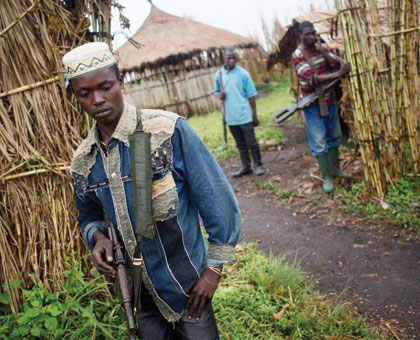The UN Security Council (UNSC) will today assess the approach used by its peacekeeping mission in the DR Congo (Monusco) in fighting negative forces, especially the Democratic Forces for the Liberation of Rwanda (FDLR) in eastern DR Congo.


The UN Security Council (UNSC) will today assess the approach used by its peacekeeping mission in the DR Congo (Monusco) in fighting negative forces, especially the Democratic Forces for the Liberation of Rwanda (FDLR) in eastern DR Congo.
Members of the Security Council, including Rwanda, are due to meet in New York to consider reports and consultations by Martin Kobler, the UN special envoy to DR Congo, and head of Monusco, as well as Mary Robinson, the Secretary General’s special envoy to the Great Lakes Region.
The session comes barely a week after media reports indicated that Monusco and the Congolese army (FARDC) are attacking strongholds of FDLR, a terror group largely responsible for the 1994 Genocide against the Tutsi in Rwanda.
A press officer at Rwanda’s Mission to the UN told The New Times on Thursday that they are aware of latest reports about attacks against FDLR and plan to address concerns to Kobler.
"We are concerned that these so-called attacks against FDLR only seem to surface when Kobler is about to address us at the Security Council and after that, we do not hear anything else,” Chantal Uwizera, the press attaché at Rwanda’s Permanent Mission to the UN, said in an e-mail.
"We want to know how Kobler intends to address the FDLR issue. He has on several occassions said that attacking FDLR is difficult, because they travel in a pack with women and children yet Monusco has a mandate to protect civilians,” Uwizera said.
Western media last Sunday broke news that the Congolese army, FARDC, and Monusco carried out joint operations against the militia.
However, there are no reports on causalities or any indication that this is a sustained military operation.
Kobler on Wednesday tweeted that: "The operations aim at neutralising the FDLR and its allies. They will also help re-establish State authority.”
Friday’s meeting comes at a time when Monusco’s current mandate has only 16 days left to expire. The mandate ends on March 31.
The renewal of the Mission’s mandate will not be discussed since this is a meeting for the UNSC aimed at assessing the UN mission’s report and the one about the Peace, Security and Cooperation Framework (PSC) for the DR Congo and the region.
But in the next few days, the Security Council is expected to start negotiating a draft resolution for mandate renewal. The draft resolution must be adopted before March 31.
The PSC for the DR Congo and the region was signed by 11 African leaders on February 23,2013.
Supporting mandate renewal
France, being the penholder on DR Congo, will propose a draft Security Council resolution to experts of the other 14 UNSC members, with negotiations likely to take place in the course of next week.
As regards the renewal of the mandate, Uwizera said: "We support the renewal since there is still a threat of instability in the DR Congo.”
"However, emphasis should be put on FIB (UN Force Intervention Brigade) to be able to effectively implement its mandate in a neutral way. For instance, the FIB used force against M23 rebels but has been silent on FDLR, even though the last resolution mandates it to neutralise all armed groups,” Uwizera added.
Commanded by Tanzanian General, James Mwakibolwa, the FIB is a special brigade under Monusco, authorised by the Council on March 28, 2013 through Resolution 2098.
It is the first UN peacekeeping unit specifically tasked to carry out targeted offensive operations to neutralise armed groups threatening State authority and civilian security, with or without FARDC support, in eastern DR Congo. Comprising 3,069 peacekeepers (in addition to nearly 20,000 other Monusco troops), the special brigade helped defeat the Congolese M23 rebel group last year.
Resolution 2098, among others, requests the Secretary General to report to the Council every three months in coordination with his Special Representative for the DR Congo on the implementation by Monusco of its mandate, including on deployment, readiness and activities of the FIB and all other UN forces.


